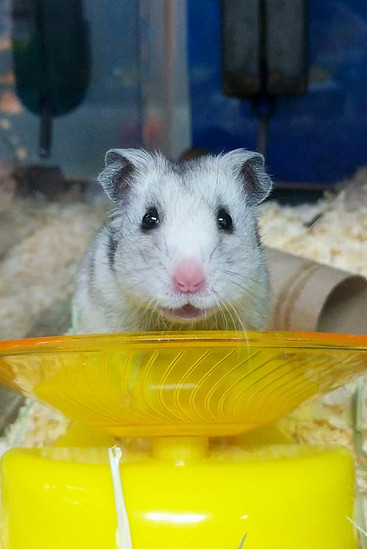
Caring for a Hamster
Hamsters make great family pets - sleeping during the day and becoming active in the evening - which is ideal for most family schedules. Syrian (or Common) Hamsters are solitary and should be kept alone. Most hamsters are very easy to handle once they've learned to trust you, so allow your new friend a few days to settle into its new home before handling it. Offering food from your hand helps build their confidence in you, however, do not offer food from your fingers through cage bars as this could teach them that fingers near the cage are okay to bite. Regular exercise in a safe area outside of the cage is important. Wait for your hamster to wake up on its own before trying to handle it, because even the friendliest of hamsters can become irritable and bite when startled.
HOUSING
Syrian Hamsters need a cage of at least 24"x16"x12" with a solid bottom and wire top. An easy way to provide adequate space is to connect smaller cages with tunnels, such as Critter Trail cages. Add a sleeping house, filled with nesting material like shredded paper or hay, and choose toys such as a running wheel, ladder, or ramp. Hamsters love to burrow in deep layers of safe bedding such as Carefresh. Never use cedar shavings, as these contain harmful oils that are hazardous to your pets health.
DIET
A healthy hamster diet is based on a dry food of lab blocks (square meal) available at all times, and a small amount of seeds. Timothy or grass hay may also be provided, along with fresh fruit and vegetables as a treat once per week. Since hamsters are omnivores, they may also enjoy high protein treats such as nuts, mealworms, yogurt, or cottage cheese on occasion. Fresh water in a water bottle should be available at all times.
CLEANING
Spot clean soiled areas of the cage a minimum of 2-3 times per week and scrub the entire cage clean once per week, including the toys, food dishes and water bottle. Hamsters can be potty trained, as they already tend to designate one or two corners of the cage for bathroom use. Always rinse and dry the cage well before adding bedding. Reusing some of the old nesting material will help your hamster feel comfortable at home.
HEALTH
Be alert and consult a veterinarian if you notice signs of illness or injury to your pet, such as a lack of droppings or soft droppings, excessive drinking/urinating, dirty/wet/patchy fur, sneezing, wheezing, runny nose, limping, cuts, or bumps.
